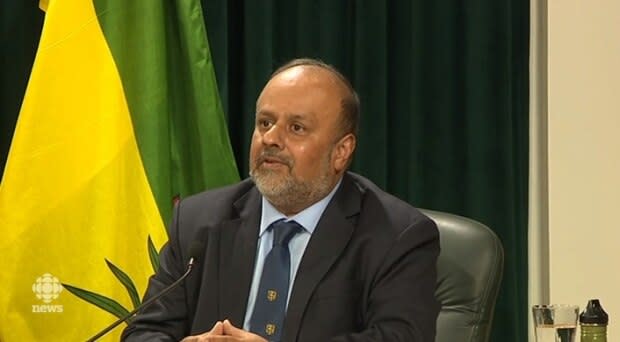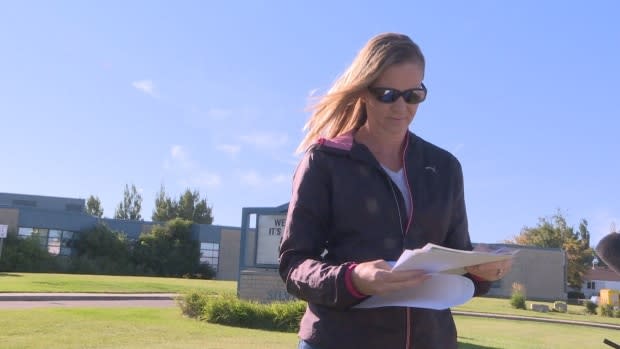COVID-19 concerns alleviated for some parents after detailed school plan released
Parents in Saskatchewan now know what will happen if their child or a classmate tests positive for COVID-19 and clarity from the government appears to be calming the concerns of some parents.
The Government of Saskatchewan's Back to School Plan, which was criticized heavily by teachers and parents upon its release, has undergone several changes over the past month, with the government allocating divisions more money and more time to get prepared.
Then, last week, the government detailed how it plans to contain positive cases of COVID-19 in schools, releasing an information package specifically for parents.
The package touched on everything from what will be required to declare an outbreak at a school, to what would cause an entire school to convert to non-classroom learning.
Facebook post offers parent perspective
Adrienne Ivey is a mother and an agricultural advocate in Ituna, Sask. and she recently took to Facebook to express how she feels about sending her kids back to school.
In the post, which has been shared online more than 1,600 times, Ivy detailed how she feels it's a problem parents are failing to address the all risks their children face, saying they've fallen victim to focusing on only one: COVID-19.
"During the Covid-19 lockdowns, it has been our children who have given up more than anyone else. Not only have we taken their social lives, their hobbies, and their sports," she said in the post. "We have halted their formal schooling, and put barriers up for their emotional and social skill development."
Ivey appeared on CBC Saskatchewan News at Six to discuss the post and her feelings about sending her kids back to school with host Sam Maciag, saying she's always been one to find the bright side in anything.
"There are so many positives of kids going back to school," she said. "For my kids in particular, being out on the farm, they are craving social interactions with people other than their sibling and parents — so badly."
Ivey said in her community, friends and family are excited to send their kids back to school and that there's a level of comfort since they know teachers and administrators have been working hard in preparation for the arrival of students.
She feels parents need to have conversations about the risks associated with COVID-19 and the return to school, but also talk about the risks associated with keeping kids home as well.
"My greatest worry is just the long-term effects of what these COVID shutdowns will have on our young people," she said, noting while the pandemic has been hard for everyone, children have had "everything taken away from them."
"They have no sense of control themselves, so the sooner that we can get them in situations where they do have a sense of normalcy, whether it's school or sports, the better they will be in the long-term."
Dr. Shahab says expect disruptions
On Friday, the province's Chief Medical Health Officer Dr. Saqib Shahab, said it's important for people to continue following public health guidelines as school resumes, noting it's time for people to shrink their summer social bubbles.
"We should be able to count our close contacts on the fingers of our hand," he said. "We know that these methods have worked well for us in Saskatchewan and they have kept our active case numbers — for the most part — extremely low."
At the press conference, Dr. Shahab said the Government understands this is an "extraordinary year" for students, family and staff, noting success in reopening other parts of the province shows following guidelines is an effective way of combating COVID-19.

"These guidelines will continue to evolve based on not just what we learn from school reopening, but also from our community transmission levels," he said. "If they were to change, obviously our guidelines would need to evolve to accommodate that."
Shahab said the "vast majority" of parents have opted for in-school learning, but noted it'll be up to families to determine what is the best choice for their kids. However, he noted parents should be prepared for several disruptions — either with their child or their class — throughout the school year.
"School divisions are working very hard to ensure that during all of these disruptions education will continue with as much continuity as possible," said Shahab.
Education Minister Gordon Wyant has called Saskatchewan's plan the best in Canada and said he has "no regrets" about its content and how it was rolled out.
But the group that represents Saskatchewan teachers had some choice words about the plan over the weekend, with Saskatchewan Teachers' Federation president Patrick Maze criticizing it openly on Twitter.
"A series of random government announcements released over several months, each reacting to new developments regarding a global pandemic does not constitute a "plan"," Maze said in Tweet. "And said "plan" should never then be duplicitously labelled as "the best plan in Canada."
Parents feeling positive about recent plans
But parents like Noelle Hubbard, who has three kids set to attend school in Saskatoon, are feeling positive about sending kids back to school, as she feels plans to contain COVID-19 cases are solid.
"At some point, we have to trust the people that are putting it together," she said. "They're educated. They're in consultation with all of the parties involved and I think they're making the best decisions they can, given the amount of information everyone has got."
Hubbard says she's comfortable with the numbers outlined in terms of when an outbreak would be declared and when a school-wide change may take place, as it gives everyone a uniform picture of the process.
She does have some questions about who will be making the judgment calls on what symptoms would result in a child being sent home, however.
"What's it going to take?" she asked.
"Is it going to be a simple belly ache, and 'oh my goodness, they can't be at school?' Is it going to be a tiny sniffle from just running outside on the playground during recess and they're going to think that they should go home and get a COVID swab?" she asked. "So I'm a little concerned at those levels of parameters."

For Hubbard and her family, she said the time to go back to school is right.
"The kids have suffered so much during the pandemic, they need some sort of normalcy," she said.
We should support them as much as possible and encourage them along the way as well, just like we should encourage our kids. - Alicia Hanowski, Regina parent on supporting Sask. teachers
Alicia Hanowski has three kids attending school in Regina. She too feels the plans will help keep her kids safe.
Hanowski feels the thresholds in place are suitable and the plan should be given a chance, as everyone is ready to get back to the "new normal."
"We need to let the process take place and let our teachers take the time to see if this plan is going to be effective," she said. "Again, there was no manual on how to be a teacher in a pandemic. We need to give them the opportunity to teach our kids, to support them and understand where they're coming from."
Like many parents across the province, Hanowski said she's had extensive conversations with her kids about the return to school, and even plans to visit her younger childrens' school to help them become familiar with all the changes.
She said it's important that families and their students are behind Saskatchewan teachers as they try to educate the masses in the face of a list of unknown challenges.
"We should support them as much as possible and encourage them along the way as well, just like we should encourage our kids," she said, noting: "We're all in this together."
"This is another starting of "Day 1" of being students and teachers and parents in a pandemic and I think we should all support each other."


